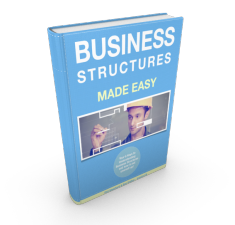Business Structures Made Easy! Part 2: Sole Trader
Should I Trade as a Sole Trader?
Establishing a business as a sole trader is the simplest form of business structure. It is relatively easy and inexpensive to start and maintain.
Many sole traders choose to trade under their own name but this is not a requirement. A sole trader can register a business name with the Australian Securities and Investments Commission (ASIC) and trade using this name instead.
A sole trader is essentially just the individual in business for themselves – they retain complete control of the business operation. There is no division between business assets or personal assets, which includes any assets jointly owned with another person (such as your house or car).
Your liability is unlimited which means that personal assets can be used to pay business debts. The individual is also responsible for remitting the tax on any business profits made at their marginal income tax rates.
After your first year of business profits the Australian Taxation Office will enter you into the pay as you go (PAYG) instalments system. The PAYG system requires regular payments of preliminary tax based on expected profits for the following year. Any excess tax paid as a result of this will be refunded on lodgement of your income tax return.
Pro’s and Con’s of Running a Business as a Sole Trader
Advantages of Trading as a Sole Trader
- Easy and inexpensive to establish and maintain; Complete control of your assets and business decisions is retained by individual;
- Fewer reporting requirements;
- Any losses incurred as a result of business activities may be offset against other income earned (such as investment income or wages), subject to satisfying certain conditions;
- You are not considered an employee of your own business and are free of any obligation to pay payroll tax, superannuation contributions or workers’ compensation on income your draw from the business;
- Relatively easy to change your legal structure if the business grows, or if you wish to wind things up.
Disadvantages of Trading as a Sole Trader
- Unlimited liability which means all your personal assets are at risk if the business operation gets in trouble;
- Little opportunity for tax planning – you can’t split business profits or losses made with family members and you are personally liable to pay tax on all the income derived;
- Business debts and losses cannot be shared;
- Requirements to pay preliminary tax on business income which may not have been earned;
- Limited access to additional capital for business growth;
Click Here to Download our eBook “Business Structures Made Easy”
Word of Warning Against Trading as a Sole Trader
At Inspire CA we strongly recommend business owners avoid operating as a sole trader.
Even a business which is not generating sufficient income to require a great deal of tax planning can still expose the owner’s personal assets to significant risk.
If you are currently operating a small business as a sole trader please refer to the articles later in this series which explore your alternative structuring options, or contact Inspire CA for assistance.




